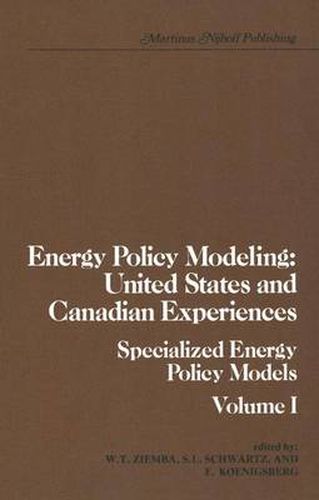Readings Newsletter
Become a Readings Member to make your shopping experience even easier.
Sign in or sign up for free!
You’re not far away from qualifying for FREE standard shipping within Australia
You’ve qualified for FREE standard shipping within Australia
The cart is loading…






This title is printed to order. This book may have been self-published. If so, we cannot guarantee the quality of the content. In the main most books will have gone through the editing process however some may not. We therefore suggest that you be aware of this before ordering this book. If in doubt check either the author or publisher’s details as we are unable to accept any returns unless they are faulty. Please contact us if you have any questions.
Alex Cowie As the twentieth century draws to a close, one of our greatest problems is the availability of energy. One way to study the energy problem is to resolve it into four areas; energy demand, energy sources, transportation of energy from sources to demand centers, and the optimal allocation of energy forms to demands. Each of these areas is extremely complex by itself. When efforts are made to tie them together, for example, to produce a National Policy, the complexities are compounded. Another way to study the energy problem, because of its political and so cial consequences, is to resolve it into geographical areas. Individual prov inces of Canada or states of the United States will have their concerns about energy within their geographical boundaries. As producer, consumer, or both, each wants to ensure an energy development program which will work to the maximum benefit of its citizens. Similarly, countries endeavor to pro tect their citizens and undertake energy policies that will assure either a con tinuation of the existing quality of life or - particularly in the case of Third World countries - a marked improvement in quality of life. These competing and conflicting goals call for a study which encompasses the whole world. Again, complexity is piled upon complexity. If the prob lem is not yet sufficiently complex, there is an equally complex question of the effect of energy production and use on the ecology.
$9.00 standard shipping within Australia
FREE standard shipping within Australia for orders over $100.00
Express & International shipping calculated at checkout
This title is printed to order. This book may have been self-published. If so, we cannot guarantee the quality of the content. In the main most books will have gone through the editing process however some may not. We therefore suggest that you be aware of this before ordering this book. If in doubt check either the author or publisher’s details as we are unable to accept any returns unless they are faulty. Please contact us if you have any questions.
Alex Cowie As the twentieth century draws to a close, one of our greatest problems is the availability of energy. One way to study the energy problem is to resolve it into four areas; energy demand, energy sources, transportation of energy from sources to demand centers, and the optimal allocation of energy forms to demands. Each of these areas is extremely complex by itself. When efforts are made to tie them together, for example, to produce a National Policy, the complexities are compounded. Another way to study the energy problem, because of its political and so cial consequences, is to resolve it into geographical areas. Individual prov inces of Canada or states of the United States will have their concerns about energy within their geographical boundaries. As producer, consumer, or both, each wants to ensure an energy development program which will work to the maximum benefit of its citizens. Similarly, countries endeavor to pro tect their citizens and undertake energy policies that will assure either a con tinuation of the existing quality of life or - particularly in the case of Third World countries - a marked improvement in quality of life. These competing and conflicting goals call for a study which encompasses the whole world. Again, complexity is piled upon complexity. If the prob lem is not yet sufficiently complex, there is an equally complex question of the effect of energy production and use on the ecology.